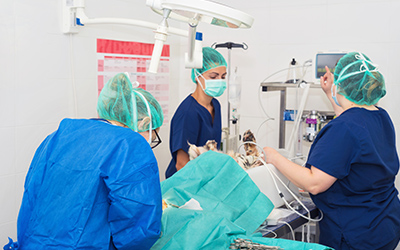Arthroscopy

What is Arthroscopy?
Arthroscopy is a minimally invasive surgical technique performed in case of joint injuries in cats and dogs. Following anesthesia, a specialized instrument (arthroscope), its size ranging from 1.9mm to 3.1mm is introduced into the joint through a small incision. At the end of the arthroscope, a camera is attached which shows the images within the joint in a TV monitor. Dr. Pozzi will examine the joint structures and treat the disease condition using miniature instruments.
Arthroscopy can be performed as a diagnostic or a therapeutic procedure. Dr. Pozzi will evaluate the severity and extent of the joint disease in your dogs and cats, which would be followed by distinct surgical treatment of the joint disease.
Indications for Arthroscopy in Animals
Arthroscopy in pets can be indicated for:
- Osteochondritis dissecans (OCD)
- Shoulder instability
- Biceps tenosynovitis
- Fragmented medial coronoid process
- Medial compartment disease diagnosis/ treatment
- Ununited anconeal process
- OCD of the medial humeral condyle
After care of Arthroscopy
As the procedure is minimally invasive, you dog or cat would be discharged within few days. There might be some mild discomfort after surgery but Dr. Pozzi will provide your pets with pain medications. The recovery is usually faster when compared to traditional procedures so there is no need for any major lifestyle restrictions for your pets.
Knee Arthroscopy
The canine stifle or knee joint is the area liable for the majority of canine orthopaedic problems. Arthroscopy is key in recognising the problem before performing any type of surgical procedure. Knee arthroscopy may ease painful symptoms of many problems that damage the cartilage surfaces and other soft tissues surrounding the joint. Knee arthroscopy is done on your pets in case they suffer from conditions such as knee pain, arthritis, meniscal tears or patellar luxations.
Shoulder Arthroscopy
Shoulder injuries are common in your pets and most commonly in performance canine’s. The shoulder joint consists of a ball and socket joint, where the head of the humerus remains attached to the socket of the scapula called the glenoid. Tendons and ligaments around the shoulder joint provide strength and stability to the joint. Injury and disease to the bones or soft tissues of the shoulder joint during any activity of your pets can make it unstable, and lead to pain, inflammation and reduced mobility. This procedure is mostly indicated when your pet is suffering from front leg lameness, pain in the shoulder joint or OCD. Shoulder arthroscopy can also help diagnose soft tissue injuries to the tendons and ligaments.
Elbow Arthroscopy
Elbow arthroscopy, also referred to as keyhole or minimally invasive surgery, is performed through tiny incisions to evaluate and treat several elbow conditions. Any history of trauma, fighting with other animals, falling from great heights may lead to injuries to the elbow of your dogs and cats. Younger dogs tend to fracture more easily than the elder ones. If your dog or cat is suffering from fore limb lameness/stiffness, pain or inability to bear weight on the elbow, it is advised that you take your pets to its doctor who can provide proper diagnosis and treatment.
Tarsus Arthroscopy
The tarsus of dogs and cats is the area which is frequently affected compared to the other parts. One of the most common condition that affects the tarsus of the dogs and cats is ligament injury. If your dog or cat is suffering from tarsus injury it would show symptoms like- difficulty in walking & playing, tiredness, pain in the tarsus area. If you notice such symptoms, take your pets to the vet who will provide them with appropriate diagnosis and treatment.
Hip Arthroscopy
Hip injury is most commonly seen in canines. The problem ranges from mild to severe and often begins in puppies from very young age. Arthroscopy of the hip is useful to determine if there is any cartilage damage or any other injuries in the hip of your dog. The clinical signs vary and include stiffness near the hip area, exercise intolerance, difficulty in getting up or lying down, difficulty in climbing stairs, and gait abnormalities.
Prof Dr. Antonio Pozzi – veterinary specialist and surgent at the University of Zurich
Prof. Dr. Pozzi is Head of the clinic for small animal surgery, University of Zurich. His team of specialists, surgeons, veterinariens are dedicated to the well being of dogs and cats.




